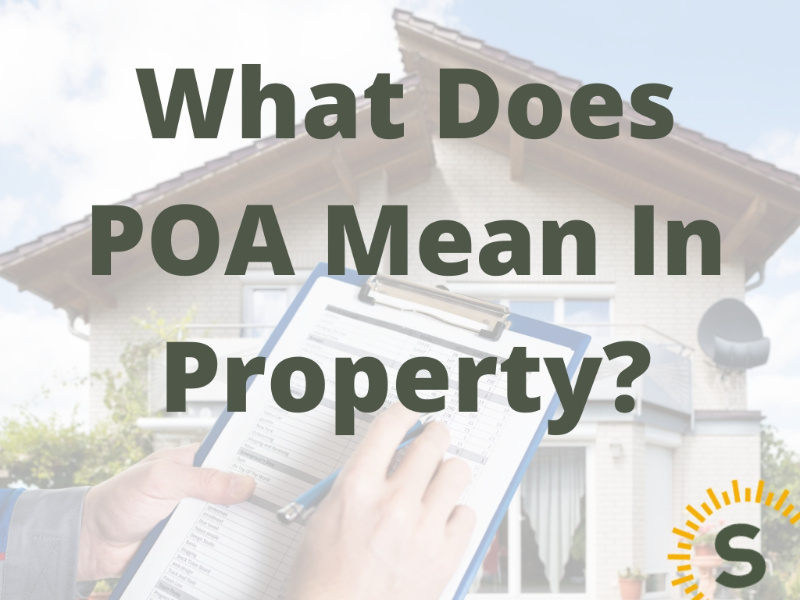Navigating the world of real estate can sometimes feel like deciphering a complex code. Among the many terms you’ll encounter, “Poa” might just leave you scratching your head.
What does it mean, and why is it important for your real estate journey? Whether you’re buying, selling, or just curious about property dealings, understanding “Poa” can save you time, money, and potential headaches. Imagine having the power to make informed decisions with confidence.
You’re about to discover how this seemingly small term can have a big impact on your real estate experience. Ready to unlock the secrets of “Poa”? Let’s dive in and ensure you’re not left in the dark.
Understanding Poa In Real Estate
POA stands for Power of Attorney. This is a legal document. It gives someone else the right to act for you. This can be useful in real estate deals. Sometimes, you cannot be present. POA allows a trusted person to sign papers. This helps in buying or selling homes.
Real estate transactions need many signatures. Being there every time is hard. A Power of Attorney solves this issue. It keeps the process smooth. Trust is key here. Choose someone you trust completely.
- General POA: Covers many tasks.
- Special POA: For specific tasks only.
- Durable POA: Stays valid if you become ill.

Credit: www.sunnyavenue.co.uk
Common Interpretations Of Poa
POA stands for Power of Attorney in real estate. It is a legal document. Someone else can make decisions for you with it. Important for buying or selling property. Price on Application is another meaning. It means the price is not shown openly. You must ask for it. Sometimes POA means Port of Authority. It is related to shipping and logistics. Not common in real estate. Each meaning has a different use. Knowing the context is key. Helps in understanding the right meaning. Always check what POA refers to. This avoids confusion. Real estate terms can be tricky. Make sure you understand each one.
Poa In Pricing Strategies
POA stands for Price On Application. It means the price is not shown. This can make a property look exclusive. Buyers feel curious. They may think the property is special. POA can help sellers keep prices flexible. It allows them to change prices easily. This is useful in a changing market. POA can also help sellers keep their privacy. They do not need to share the price with everyone. Some buyers may feel more comfortable asking for the price.
Not everyone likes POA. Some buyers find it frustrating. They may skip properties with POA. It takes time to ask for prices. This can make the process slow. POA may also seem secretive. Buyers might think the price is too high. If too many properties use POA, it can confuse buyers. They want to compare prices easily. POA can make this hard. Sellers need to decide if POA is right for them.

Credit: realestateagentslondon.co.uk
Legal Implications Of Poa
Power of Attorney (POA) allows someone to act for another. This person is called an agent. They make important decisions. These decisions can include signing contracts. Contracts are agreements between people or companies. POA must be clear in contracts. It needs to say what the agent can do. Without this, mistakes can happen. Mistakes can cause problems later. Problems might include broken agreements. Broken agreements can lead to court.
Legal rules are very important with POA. They keep things fair. The agent must know these rules. They must follow them closely. If rules are broken, it can be serious. Serious issues can lead to legal trouble. Legal trouble can be costly. Both time and money can be lost. Understanding POA rules is smart. It helps avoid issues. It keeps things clear and safe.
Poa From A Buyer’s Perspective
POA means Price on Application. It gives buyers a chance to ask about the price. This can make buyers feel special. Some sellers like to keep the price private. This can create interest in the property. Buyers feel they have a chance to negotiate. They may get a better deal. POA can make buyers curious. It can make them want to know more. This can lead to more serious buyers. It keeps the buying process exciting.
POA can make buyers nervous. They may think the price is too high. Some buyers may not want to ask. They feel shy or unsure. It can slow down the buying process. Buyers may miss out on the property. They may look for homes with clear prices. POA can be confusing. Buyers want to know the price right away. They might think the seller hides something. This can lead to trust issues.
:max_bytes(150000):strip_icc()/powerofattorney-ff589039a330409982319bb5d65f2d7b.png)
Credit: www.investopedia.com
Poa From A Seller’s Perspective
Sellers use POA, or “Price on Application,” to keep the price secret. This strategy creates curiosity among buyers. Buyers may contact the seller for more details. It helps sellers negotiate better deals. They can adjust the price based on buyer interest. POA also gives sellers a sense of privacy and control. They decide who gets the pricing information. This can be helpful in competitive markets.
Using POA might make buyers frustrated. Some may skip the property if the price is hidden. Sellers may lose potential buyers this way. It can also lead to increased inquiries. This requires time and effort to answer. Some buyers may think the price is too high. They might assume it’s out of their budget. Sellers should weigh these risks carefully.
Market Trends Influencing Poa
Economic factors play a big role in real estate. When the economy is strong, people buy more homes. This makes property prices go up. But, when the economy is weak, prices can drop. Interest rates also matter. Low rates make it easier to buy homes. High rates can make buying harder. Jobs matter too. More jobs mean more people can buy homes. Less jobs mean less buying.
Consumer behavior affects real estate a lot. People want to live in good areas. They look for safety and schools. If a place is popular, prices rise. People also like new features in homes. Things like smart tech can attract buyers. Some people prefer green homes. These homes save energy. Trends change what people want in a home.
Future Of Poa In Real Estate
The future of POA in real estate is exciting. More people use Power of Attorney in deals. POA helps make decisions easier. It is like giving someone you trust the power to act. This helps when you are busy or far away. Imagine buying a home while on vacation. POA makes it possible. It allows important moves without delays.
Technology plays a big role too. Digital tools make POA faster and safer. Online signatures save time. They reduce paperwork. People feel more secure using digital POA. It is less risky and more efficient.
Real estate agents also benefit. They close deals quicker. POA helps agents serve clients better. Everyone saves time and effort. The process becomes smooth. As more people learn about POA, its use will grow. It is a helpful tool for future real estate.
Frequently Asked Questions
What Does Poa Stand For In Real Estate?
Poa in real estate often stands for “Power of Attorney. ” It allows someone to act on another’s behalf in property transactions. This can include buying, selling, or managing real estate. It’s crucial for individuals who cannot handle their real estate matters personally.
Why Is Poa Important In Property Dealings?
Poa is vital in property transactions because it grants legal authority to another person. It ensures smooth handling of real estate matters when the owner can’t be present. This is particularly useful for elderly or busy individuals needing assistance with property management.
How Does Poa Affect Real Estate Transactions?
Poa affects real estate transactions by enabling appointed agents to execute deals. This includes signing contracts, negotiating terms, and managing assets. It simplifies processes when the owner is unavailable or incapacitated, ensuring continuity in property management.
Can Poa Be Revoked In Real Estate?
Yes, Poa can be revoked in real estate. The principal can cancel it anytime as long as they are mentally competent. Written notice is typically required to terminate the authority granted. It’s crucial for maintaining control over real estate decisions and responsibilities.
Conclusion
Understanding POA in real estate is crucial for informed decisions. It stands for “Power of Attorney. ” This legal document grants authority to act on someone’s behalf. Knowing its role helps in smooth property transactions. Buyers and sellers should grasp its significance.
It can simplify complex deals. Always consult a legal expert for guidance. This ensures clarity and proper use. Remember, knowledge empowers you in real estate. Stay informed and make wise choices. Your real estate journey becomes easier with the right insights.
